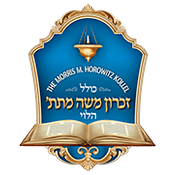Parshas Vaeschanan 1


׳׳רק השמר לך ושמור נפשך…׳׳ ׳׳ונשמרתם מאד לנפשתיכם…׳׳ דברים ד:ט/טו
“Only watch yourself and guard your soul…” “Guard carefully your souls…” Devarim 4:9/15
The Gemara in Brachos on דף לב brings down the story of a Chassid who was davening Shemoneh Esrei when he was chanced upon by a powerful king. The king greeted our hero, who did not respond. The king waited until the Chassid finished his Tefillah before berating him. “Empty one!” declared the king in a condescending tone, “Is it not written in your Torah ׳׳רק השמר לך ושמור נפשך׳׳ and ׳׳ונשמרתם מאד לנפשתיכם׳׳ ? When I greeted you why did you not respond? If I were to have you decapitated with a sword, would anyone avenge your blood?” The Chassid calmly responded, “Allow me to appease you with words.” He said, “If your royal highness were to have been standing in the presence of another imperial figure made of flesh and blood and a passing friend were to have extended his greeting, would you have dared respond?” “Of course not,” the king replied. “And if you were to have answered your friend in the face of said king, what do you suppose he would have done to you?” asked the Chassid. “Why he surely would have chopped off my head!” exclaimed the king. The Chassid continued, “If it is understandable that had you been standing in the presence of a king made of flesh and blood, who is but here today and tomorrow lies in the grave, you would act in this fashion, all the more so when I myself was standing before the King of all kings, Hashem, who exists eternally, would I not turn to answer you.” The king was immediately appeased and returned the Chasid to his home in peace.
The Maharsha is bothered by the question of the king, which he based off of these particular pasukim in the Torah. The Maharsha explains that these pasukim are not dealing with the commandment to protect ones life, rather they are referring to the prohibition against forgetting ones Torah learning, as the continuation of the pasuk states .׳׳פן תשכח את הדברים׳׳ We remember last weeks Pirkei Avos, ׳׳כל השוכח דבר אחד ממשנתו… כאילו מתחייב בנפשו׳׳ as the pasuk states, ׳׳רק השמר לך…׳׳.
The Rambam, however in ׳׳הלכות רוצח ושמירת הנפש׳׳ in פרק יא הלכה ד states that any obstacle that poses a threat to human life carries with it a מצות עשה which obligates passerby to be wary of it and remove it, as the pasuk states, ׳׳השמר לך ושמור נפשך…׳׳ . The Rambam blatantly holds that these pasukim are indeed referring to guarding oneself from physical harm.
The Torah Temimah expounds on these pasukim and declares that the widespread custom of people in our times to quote the pasuk of ׳׳ונשמרתם׳׳ with regard to protective measures against physical harm is a mistake according to the Maharsha. The Torah Temimah does however back up the Rambam from a Gemara in Shavous that learns out the warning against a person cursing himself from the pasuk of ׳׳השמר לך ושמור נפשך׳׳.
The Rambam learns that these pasukim warn us to protect ourselves from physical harm. The Maharsha explains that these pasukim warn us not to forget our Torah learning. Perhaps we can explain that these two Torah giants are working together. We can begin with the words of the Rebbi from Lublin, who says that the word ׳׳רק׳׳ means a small amount and what the pasuk is telling us is that we must safeguard our physical bodies minimally, however with regard to retaining our Torah ׳׳ושמור נפשך מאד׳׳ we must be ever the more vigilant to make sure that we do not forget even one word of our learning. In a similar vein, the אור צדיקים says that the whole point of ׳׳ונשמרתם…׳׳ , which means to watch over our health is only for the sake of ׳׳לנפשותיכם׳׳ – the continuity of our ability to learn Torah, as a weak body puts a damper on our concentrative abilities.
Maybe we can take it even one step further. The pasukim in this weeks Parsha warn us to be ever cautious not to forget a word of our Torah learning. As we saw in Pirkei Avos, laxity in this area will cause a person to be in grave danger. These pasukim as well serve as a warning to refrain from placing ourselves into hazardous situations. We can therefore explain that the best way to protect ourselves from the perils that abound in these times is to place a heightened emphasis on retaining our Torah knowledge. This will guarantee our continued health as we use our physical bodies to carry on with our purpose, which is to gain depth and clarity in our studies while putting in extra effort to remember the Torah that we learn.
Moshe Rothenberg / MMHK
